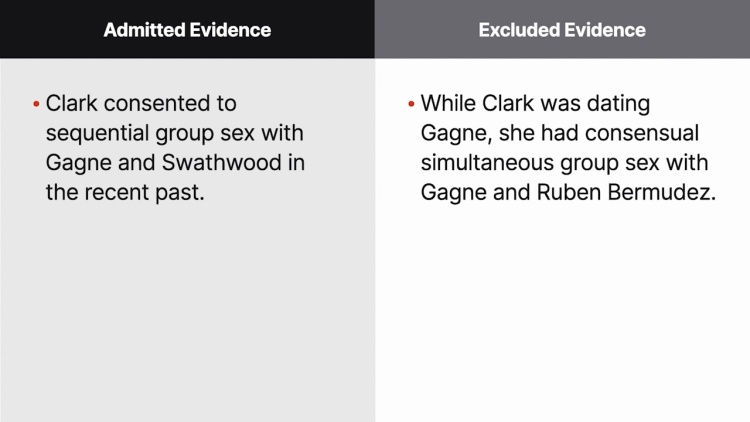Gagne v. Booker
United States Court of Appeals for the Sixth Circuit
680 F.3d 493 (2012)
- Written by Rose VanHofwegen, JD
Facts
A jury convicted Lewis Gagne and Donald Swathwood (defendants) of raping Gagne’s former girlfriend, P.C., based on an incident of brutal three-way sex. The trial court allowed evidence that Gagne and P.C. had similar sex during their relationship, including group sex with Swathwood, and that P.C. initially consented to sex with Gagne on the night in question. However, the judge did not allow evidence that Gagne and P.C. previously had group sex with a third man, or that P.C. had offered to have sex with Gagne and his father. The court found those two incidents not admissible under the Michigan rape shield statute, which allows “evidence of the victim’s past sexual conduct with the actor,” because they involved participants other than Gagne and Swathwood. After appeals in Michigan state courts failed, Gagne filed a habeas corpus petition in federal court asserting violation of his constitutional rights to a fair trial, to confront witnesses, and to present a complete defense. Gagne argued that the evidence that P.C. previously consented to group sex with him was clearly relevant to whether she consented to it on the night charged. The district court granted the petition, and the Sixth Circuit affirmed, but granted the State’s request for rehearing.
Rule of Law
Issue
Holding and Reasoning (Batchelder, C.J.)
Concurrence (Moore, J.)
Concurrence (Clay, J.)
Dissent (Kethledge, J.)
What to do next…
Here's why 907,000 law students have relied on our case briefs:
- Written by law professors and practitioners, not other law students. 47,100 briefs, keyed to 996 casebooks. Top-notch customer support.
- The right amount of information, includes the facts, issues, rule of law, holding and reasoning, and any concurrences and dissents.
- Access in your classes, works on your mobile and tablet. Massive library of related video lessons and high quality multiple-choice questions.
- Easy to use, uniform format for every case brief. Written in plain English, not in legalese. Our briefs summarize and simplify; they don’t just repeat the court’s language.





